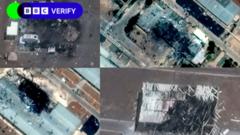The International Atomic Energy Agency confirmed that while the Israeli military's attacks resulted in significant damage to Iran's enrichment sites, particularly at Natanz, the underground facilities remain intact with no new damage noted, keeping radiation levels stable.
**Israel Strikes Cause Damage at Iran's Nuclear Sites, But No Further Damage Reported**

**Israel Strikes Cause Damage at Iran's Nuclear Sites, But No Further Damage Reported**
In the wake of recent Israeli airstrikes, the IAEA reports no additional harm to subterranean nuclear facilities in Iran.
---
The head of the International Atomic Energy Agency (IAEA), Rafael Grossi, reported that there has been no further damage to Iran's underground nuclear facilities following recent Israeli airstrikes on the country’s nuclear sites. During a meeting with member states in Vienna, Grossi addressed the destruction of an above-ground enrichment plant at Natanz, a key facility in Iran’s uranium enrichment program. He indicated that while significant damage occurred, notably to four buildings at the Isfahan site—including a uranium conversion plant—no evidence of a physical attack at the underground facilities was observed.
Following Friday's attacks, Israel claimed responsibility for the strikes, asserting they targeted facilities believed to be involved in weaponizing enriched uranium, which has dual-use potential in both energy and weapon production. The Israeli military stated that the strikes resulted in the deaths of nine Iranian nuclear scientists. Iran has staunchly maintained that its nuclear intentions are peaceful, urgently calling for condemnation of the Israeli actions from the IAEA’s board.
Grossi highlighted that the Pilot Fuel Enrichment Plant (PFEP) at Natanz, where uranium was enriched to 60%—close to the threshold for weapons-grade uranium—sustained major losses, with crucial power infrastructure also affected. He stated that while there were signs of radiological and chemical contamination at the site, off-site radioactivity remains normal.
Furthermore, Iranian officials reported limited damage to the Fordo enrichment site, although the Israeli military has yet to confirm any activity there. Grossi emphasized the need for restraint, warning that further military actions could escalate tensions, potentially leading to serious environmental and public health risks.
Iranian Foreign Minister Abbas Araghchi denounced the Israeli strikes as a violation of international law, framing Iran's missile responses as acts of defense. The ongoing conflict has resulted in considerable casualties, with Iranian health authorities reporting more than 220 fatalities from recent strikes, while Israel recorded 24 deaths from Iranian missile attacks.
The situation is further complicated by the backdrop of international nuclear agreements. Following the U.S. withdrawal from the 2015 nuclear deal and renewed sanctions against Iran, the country has progressively escalated its uranium enrichment activities, which the IAEA deems as non-compliant with non-proliferation obligations.
As the situation continues to unfold, the IAEA remains vigilant in monitoring Iran's nuclear capabilities amidst escalating tensions between Iran and Israel over nuclear weapon potentiality.
The head of the International Atomic Energy Agency (IAEA), Rafael Grossi, reported that there has been no further damage to Iran's underground nuclear facilities following recent Israeli airstrikes on the country’s nuclear sites. During a meeting with member states in Vienna, Grossi addressed the destruction of an above-ground enrichment plant at Natanz, a key facility in Iran’s uranium enrichment program. He indicated that while significant damage occurred, notably to four buildings at the Isfahan site—including a uranium conversion plant—no evidence of a physical attack at the underground facilities was observed.
Following Friday's attacks, Israel claimed responsibility for the strikes, asserting they targeted facilities believed to be involved in weaponizing enriched uranium, which has dual-use potential in both energy and weapon production. The Israeli military stated that the strikes resulted in the deaths of nine Iranian nuclear scientists. Iran has staunchly maintained that its nuclear intentions are peaceful, urgently calling for condemnation of the Israeli actions from the IAEA’s board.
Grossi highlighted that the Pilot Fuel Enrichment Plant (PFEP) at Natanz, where uranium was enriched to 60%—close to the threshold for weapons-grade uranium—sustained major losses, with crucial power infrastructure also affected. He stated that while there were signs of radiological and chemical contamination at the site, off-site radioactivity remains normal.
Furthermore, Iranian officials reported limited damage to the Fordo enrichment site, although the Israeli military has yet to confirm any activity there. Grossi emphasized the need for restraint, warning that further military actions could escalate tensions, potentially leading to serious environmental and public health risks.
Iranian Foreign Minister Abbas Araghchi denounced the Israeli strikes as a violation of international law, framing Iran's missile responses as acts of defense. The ongoing conflict has resulted in considerable casualties, with Iranian health authorities reporting more than 220 fatalities from recent strikes, while Israel recorded 24 deaths from Iranian missile attacks.
The situation is further complicated by the backdrop of international nuclear agreements. Following the U.S. withdrawal from the 2015 nuclear deal and renewed sanctions against Iran, the country has progressively escalated its uranium enrichment activities, which the IAEA deems as non-compliant with non-proliferation obligations.
As the situation continues to unfold, the IAEA remains vigilant in monitoring Iran's nuclear capabilities amidst escalating tensions between Iran and Israel over nuclear weapon potentiality.























